Natural Alternatives to Dishwasher
You can switch to natural dishwasher alternatives that clean effectively while reducing your exposure to harsh chemicals and environmental harm. Ingredients like baking soda, washing soda, citric acid, and essential oils provide powerful yet gentle cleaning, minimizing water pollution and skin irritation. Using white vinegar as a rinse aid also enhances residue removal naturally. These eco-friendly options balance cleaning performance with sustainability, so if you want to optimize your dishwasher care and maintenance with greener solutions, there’s more to explore.
Benefits of Using Natural Dishwasher Detergents

Although conventional dishwasher detergents are widely used, natural alternatives offer several compelling benefits that you might not have considered. When you switch to natural detergents, you reduce your environmental impact considerably. These alternatives often contain biodegradable ingredients that break down more easily, minimizing water pollution and harm to aquatic life. Additionally, natural detergents typically avoid harsh chemicals like phosphates and synthetic fragrances, which can be harmful not only to the environment but also to your health. By using these gentler formulations, you lower the risk of skin irritation and respiratory issues, supporting your well-being. Choosing natural dishwasher detergents empowers you to protect both your immediate health and the planet, aligning with a lifestyle that values freedom from toxic substances and environmental degradation.
Key Ingredients for Homemade Dishwasher Detergents
When you decide to make your own dishwasher detergent, understanding the key ingredients is essential to ensuring effective cleaning and safety. You’ll want to focus on eco friendly options that effectively break down grease and remove food residues without harsh chemicals. Common sustainable ingredients include washing soda, which acts as a powerful alkaline cleaner, and citric acid, known for its ability to dissolve mineral deposits and prevent buildup. Additionally, natural salts can soften water, improving detergent performance. Incorporating a mild, biodegradable surfactant can help lift oils, while essential oils may provide antibacterial properties and a fresh scent. By selecting these evidence-backed, sustainable ingredients, you’re not only reducing environmental impact but also gaining control over the cleaning agents in your home, aligning perfectly with your desire for freedom and responsible living.
How to Make Baking Soda-Based Dishwasher Detergent

To make your own baking soda-based dishwasher detergent, you’ll need simple ingredients like baking soda, washing soda, and citric acid, each playing a specific role in cleaning and deodorizing. Mixing them in the right proportions guarantees effective stain removal and grease cutting without harsh chemicals. Understanding how to use your homemade detergent properly can optimize cleaning performance and protect your dishwasher over time.
Ingredients Needed
Since you’re aiming for an effective baking soda-based dishwasher detergent, gathering the right ingredients is vital for both cleaning power and safety. Key components include baking soda, which acts as a mild abrasive and deodorizer, and washing soda, essential for breaking down grease and residues. You’ll also need citric acid to combat hard water deposits and boost cleaning efficiency. For eco friendly options, consider sourcing ingredients labeled as non-GMO and biodegradable to minimize environmental impact. Reliable ingredient sourcing from reputable suppliers guarantees purity and consistent performance, enhancing your detergent’s effectiveness. Avoid harsh chemicals commonly found in commercial detergents to maintain a safer household environment. By selecting these specific, natural ingredients thoughtfully, you maintain freedom from synthetic additives while achieving the best dishwasher results.
Mixing Instructions
Although assembling your baking soda-based dishwasher detergent might seem straightforward, precise measurements and thorough mixing are crucial for ideal cleaning performance. You’ll want to adhere to specific mixing ratios and blending techniques to guarantee the detergent dissolves properly and cleans effectively. Start by measuring each ingredient accurately, then combine them gradually while stirring continuously for an even blend.
| Ingredient | Mixing Ratio (cups) |
|---|---|
| Baking Soda | 1 |
| Washing Soda | 1 |
| Salt | 0.5 |
| Citric Acid | 0.5 |
| Essential Oil | 10 drops |
Applying these ratios and blending techniques helps maintain detergent consistency and maximizes cleaning power, giving you freedom from harsh chemicals without sacrificing performance.
Usage Tips
Many users find that adjusting the amount of baking soda-based detergent according to their dishwasher’s size and soil level greatly improves cleaning results. You should start with one to two tablespoons per load, increasing slightly for heavily soiled dishes. Incorporating vinegar as a rinse aid enhances residue removal without harsh chemicals. To optimize eco friendly practices, run your dishwasher only when fully loaded and use shorter cycles when possible. Regularly cleaning your dishwasher with natural agents like vinegar and baking soda supports dishwasher maintenance tips by preventing buildup and odors. Avoid overusing detergent, as excess can reduce cleaning efficiency and may leave deposits. By tailoring your detergent use and maintaining your appliance naturally, you gain control over both your cleaning effectiveness and environmental impact, achieving freedom from commercial chemical reliance.
Using White Vinegar as a Rinse Aid

White vinegar serves as an effective, natural rinse aid that can help reduce water spots and remove residue from your dishes. Its acetic acid content enhances rinse effectiveness by breaking down mineral deposits left by hard water, which traditional rinse aids usually target. Research shows vinegar benefits extend beyond cleaning; its natural acidity neutralizes alkaline residues, ensuring your glassware and utensils emerge spotless and streak-free. You can simply add white vinegar to your dishwasher’s rinse aid compartment, providing an eco-friendly alternative that avoids synthetic chemicals. This choice supports your desire for freedom from harsh detergents while maintaining high hygiene standards. However, avoid overuse on rubber seals to prevent degradation. Overall, white vinegar is a cost-effective, safe, and sustainable way to boost your dishwasher’s rinse performance naturally.
Lemon Juice for Enhanced Cleaning and Freshness
When you add lemon juice to your dishwasher, you not only enhance cleaning power but also introduce a natural freshness that synthetic additives can’t match. The acidity of lemon juice breaks down grease and limescale effectively, while the lemon zest releases a revitalizing citrus aroma throughout the cycle. This combination guarantees your dishes come out spotless and smelling clean without harsh chemicals.
| Benefit | Mechanism | Outcome |
|---|---|---|
| Grease removal | Acidic properties | Spotless dishes |
| Limescale control | Mild natural acid | Extended appliance life |
| Citrus aroma | Essential oils in zest | Fresh-smelling loads |
| Eco-friendly | Biodegradable | Reduced chemical use |
Using lemon juice grants you freedom from synthetic additives and supports a cleaner, greener home.
Combining Borax and Washing Soda for Powerful Cleaning
Although lemon juice offers natural cleaning benefits, combining borax and washing soda can greatly boost your dishwasher’s effectiveness by tackling tougher stains and residue. Borax benefits include its ability to soften water, which helps break down grease and grime more efficiently. Washing soda, a powerful alkaline substance, enhances this effect by increasing the pH level, enabling better removal of baked-on food and mineral deposits. When used together, these compounds create a synergistic cleaning action that surpasses many commercial detergents without harsh chemicals. This combination allows you to maintain clean dishes while retaining control over the ingredients you use, aligning with your desire for freedom from synthetic additives. By understanding the science behind these natural agents, you empower yourself to optimize dishwasher performance naturally and effectively.
Tips for Storing and Using Natural Dishwasher Detergents
Since natural dishwasher detergents often lack the preservatives found in commercial products, proper storage is essential to maintain their effectiveness and prevent clumping or degradation. Using airtight storage containers will protect your detergent from moisture, preserving its potency over time. Always follow precise dosage guidelines to avoid waste and guarantee peak cleaning performance.
Keep in mind:
- Store detergents in a cool, dry place to prevent chemical breakdown.
- Use clear, labeled containers to track freshness and contents easily.
- Measure detergent carefully to balance cleaning power with environmental responsibility.
Comparing Natural Detergents to Commercial Products
While natural detergents prioritize eco-friendly ingredients and gentler formulations, commercial products often emphasize powerful cleaning agents and additives for stain removal and sanitization. When evaluating natural vs commercial effectiveness, studies show commercial detergents generally outperform in removing tough grease and baked-on food due to their synthetic enzymes and surfactants. However, natural alternatives excel in biodegradability and reduced chemical exposure, offering a safer choice for your health and the environment. Your decision depends on balancing cleaning power with eco-conscious values. If you prefer less harsh chemicals and can manage occasional pre-rinsing, natural detergents may suffice. Conversely, for maximum cleaning efficiency without extra effort, commercial products remain superior. This effectiveness comparison highlights that both have distinct benefits, so understanding your priorities guarantees you choose the best fit for your dishwasher routine.
Troubleshooting Common Dishwasher Cleaning Issues
If your dishwasher isn’t delivering spotless results, it’s important to identify common causes such as clogged spray arms, improper loading, or hard water buildup. Regular dishwasher maintenance can prevent these issues and guarantee efficient cleaning cycles. Spray arms may get blocked by debris, reducing water pressure and coverage. Overloading or incorrect placement of dishes restricts water flow, leaving residue behind. Hard water deposits can accumulate, affecting performance and causing spots.
To regain control over your dishwasher’s effectiveness, consider these steps:
- Clear spray arms regularly to restore water flow and spray patterns.
- Load dishes thoughtfully, allowing space for water to reach all surfaces.
- Use natural descalers like vinegar during cleaning cycles to eliminate mineral buildup.
Frequently Asked Questions
Can Natural Detergents Be Used in All Dishwasher Models?
You’ll find that natural detergents’ compatibility factors vary across dishwasher models, so you can’t assume they’ll work universally. User experiences highlight that some machines handle these detergents well, while others may face residue or cleaning issues. It’s essential to check your model’s manual or test cautiously. By understanding these factors, you gain freedom to choose detergents that align with your preferences without risking your dishwasher’s performance.
Are Natural Dishwasher Detergents Safe for Septic Systems?
You might worry natural dishwasher detergents won’t protect your septic tank safety, but many actually do. Their eco friendly ingredients break down more easily than harsh chemicals, reducing buildup in your system. Research shows these detergents support healthy bacterial activity essential for septic function. So, if you want freedom from worrying about your septic system, choosing natural options can be both effective and safer for the environment.
How Do Natural Detergents Affect Dishwasher Longevity?
When you use natural detergents, their detergent ingredients often contain fewer harsh chemicals, which can be gentler on your dishwasher’s components. This means less buildup and corrosion, potentially extending your machine’s lifespan. However, proper dishwasher maintenance is still essential; natural detergents might not break down grease as aggressively, so you’ll want to clean filters and spray arms regularly to avoid clogs. Overall, choosing the right detergent ingredients and maintaining your dishwasher go hand in hand for longevity.
Can Natural Detergents Remove Tough Burnt-On Food?
Did you know that 60% of dishwasher users struggle with removing burnt food effectively? When it comes to cleaning effectiveness, natural detergents can tackle burnt-on food, but their success often depends on the severity of the burn and detergent formulation. You might find they work well on mild to moderate residue, but very tough burnt food could require pre-soaking or scrubbing. Choosing natural options means balancing eco-friendliness with cleaning power to keep your dishes spotless.
Do Natural Dishwasher Detergents Cause Residue Buildup?
You might wonder if natural dishwasher detergents cause residue buildup. Generally, these detergents focus on residue removal and use milder ingredients, which can be less harsh but still effective. However, their detergent effectiveness varies, so if you notice leftover film, it could be due to water hardness or detergent formulation. To guarantee freedom from residue, you may need to experiment with brands or add a rinse aid, giving you clean dishes without harsh chemicals.






